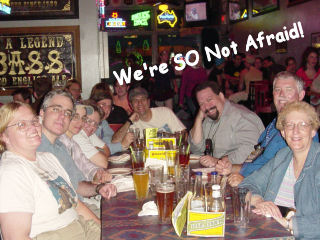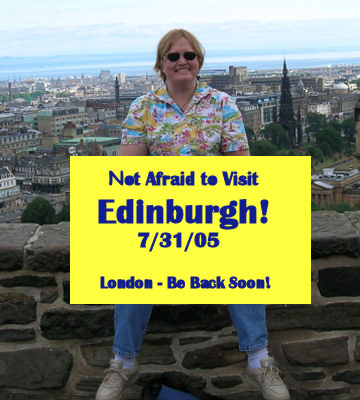Don't Panic - Suicide Bombers, Anthrax and Other Fears of Modern Life
© 2001, Laurie D. T. Mann
We should feel sorrow, but not sink under its oppression.
Confucius
I haven't been fretting much more about life and death since September 11. Sure, I had a major anxiety attack after watching about 36 hours of TV news on the night of September 12. But that was to be expected. Since then, no. I've driven to New York, New England and Maryland without any more concern than usual. I've gone to work and opened my mail.
Perhaps it's because I'm naturally a little more cynical than most people. When the media spoke of September 11 as "the day we lost our innocence," I wanted to ask what alternate reality they had been a part of. Just in my lifetime (I'm 44 now), I've seen bigotry and terrorism and war and just plain bad accidents. I've experienced sexism and hate speech. America has had many bad days in my lifetime.
While I do not remember the exact date, that terrible day in November 1978 when nearly 900 American citizens murdered members of their own families then took their own lives on the command of "religious leader" Jim Jones particularly affected me. How can people follow the insane commands of any person? Very few people ran out of the jungle to the relative safety of a nearby town. Almost everyone who was told to poisoned their children and then, themselves. The ability for nearly 1,000 people to think for themselves was completely lacking.
Or the day of the Oklahoma City bombing. Initially, we all thought it was some sort of foreign terrorist. It was almost a worse thing to learn that it was a pair of Americans who murdered 168 other Americans in cold blood.
September 11 was a bad day, but much greater in scope.
I live in Pittsburgh, a city with more bridges than any other city in the world except for Venice. I've always been aware that bridges could collapse or tunnels could be blown up, yet I travel on them daily. I flew in early December, for the first time since July. I did fret a little more than during my last plane trip, but I expected the plane would not be hijacked and that I would get to my destination safely. And home again. And, I did. Statistics bore this out, even after this year.
My husband and I went to England, a country with a long history of living with small-scale terrorism. There are more video cameras about, but I did not notice many more police. Security in English airports was a little stricter than in American airports even before September 11. It was not a coincidence that none of the September 11 planes were international planes, despite the fact a plane flying to Europe would have had even more jet fuel than a plane flying to California.
I don't want to sound too much like a Pollyanna. I'm always aware of the terrible things that could happen, but I'll go along with living regardless. Life isn't about seeing how safe we can be, it's about having many different experiences, interacting with many different people and making contributions to society. Despite the horrible events of this year, statistically, we aren't that much less safe than we've ever been. Statistically, we aren't going to die from the acts of terrorists or from a war. We're way more likely to die in car accidents or from cancer or heart disease or AIDS.
These are the facts: Terrorists, whether they be foreign or domestic, do not have limitless resources. A number of their planned activities had been discovered and stopped before September 11 and continue to be discovered and stopped now. That doesn't mean they will never succeed again - it's likely that they will. It's unlikely that they will ever be able to hijack a plane and turn it into a flying bomb. But we might have small-scale suicide bombers like those in Israel. We may have more anthrax and other acts of bioterrorism. (Frankly, the anthrax letters and most of the threats look more like the acts of the American looney fringe than the Islamic looney fringe.) The looney fringe might even deploy "dirty bombs" (bombs made with nuclear by-products, but without enough enriched uranium to go critical), but getting a real nuclear weapon is unlikely (unless the government of Pakistan collapses).
Next fact: Lots of people get their kicks from making bomb (and now anthrax) threats. Bomb threats were very common in the '70s and early '80s and making threats have made massive comeback. None of the major terrorist incidents from the last few years had any real warnings. Frankly, I'm ignoring all threats as hot air.
Anthrax has people very upset, but I have to take the attitude of Dan Rather - if we let things like anthrax paralyze us, the terrorists, whether they be domestic or international, have won. Most of the people who got anthrax were mail handlers. Most of the people who died from anthrax had compromised immune systems. It's sad that anyone has gotten sick or died from bioterrorism, but, statistically, it's unlikely to happen to you, me or the vast majority of people alive today.
The level of fear is particularly troublesome when you consider how much the world has changed over the last hundred years. One hundred years ago, the life expectancy was not all that high; people died easily from TB, from childbirth, from viruses. Yet people still went out of their homes and went on with their lives. They explored all parts of the world without being guaranteed of their safety. We who have long lives and sanitary environments should not be so afraid of dying from a statistical unlikelihood like "murdered by terrorists."
I might be more fearful if I had lost a loved one on September 11. I heard the terrible news at work, and the Internet was so slow that virtually no news was available for an hour. Once I heard about the Pentagon, I thought of my brother who lives just down the street in Alexandria. It took nearly an hour to reach his answering machine, but even hearing his voice was reassuring. I was so shocked by the events of September 11 that it was literally days later that I remembered that, with all his business travel, he could have been on one of those planes.
I have many friends who live and work in Manhattan, but they work in publishing, within sight of the twin towers, but not in them. A handful of acquaintances have not been able to return to their apartments in lower Manhattan. Still, the closest call was an acquaintance from Massachusetts was due to fly out to California from Logan Airport to have a meeting that Tuesday morning. The man he was going to see called to postpone the meeting on Monday night. The flight he cancelled himself off of later crashed into the World Trade Center.
We felt extremely safe in Pittsburgh that September 11. No one would try to crash a plane in Pittsburgh, we all reasoned. But we had friends who called us to check in, having heard about the plane that crashed some 90 miles to the east.
I did panic briefly on September 11. I stayed at work but couldn't concentrate. My job was closed down at noon that day. I wanted to do something, but couldn't think of what to do. A friend sent around E-mail, urging people to go out and give blood. So that's what I did. Having something useful to do gave me a little better focus.
Short term panic in the midst of catastrophe is understandable. We're only human after all. But long-term panic isn't good, either for the individual or for the culture. We've got to do what we can to avoid cultural panic.
Photos from a trip to New York City, December 2001
We're Not Afraid - a Great Site, Post-London Subway Bombing 2005
I submitted the following two photos, and they used the Edinburgh one:


Thanks to "Aifacat" at We're Not Afraid for finding that Confucius quote about not being oppressed by sorrow. Perhaps that's a big difference between the Americans and the Brits - I think there are a lot of Americans who wallow in sorrow as if it was a national pasttime. Both ends of the political struggle in America are quite guilty of this.